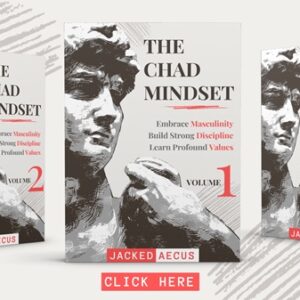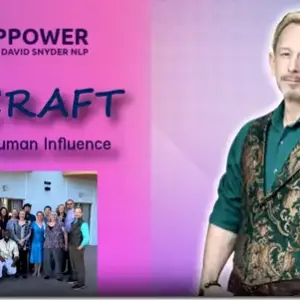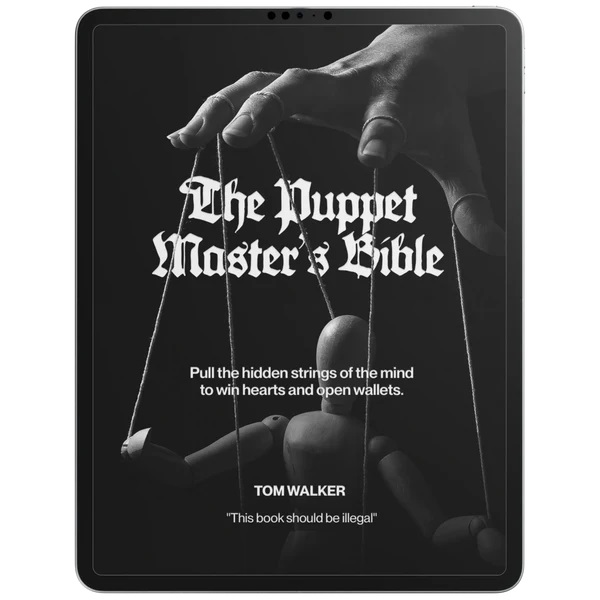The Puppet Master’s Bible – Tom Walker Audio & Ebook Combo
$224.00 Original price was: $224.00.$59.00Current price is: $59.00.
- Delivery: You Will Receive A Receipt With Download Link Through Email.
- If you need more proof ofcourse, feel free to chat with me!

Sales Page: https://tomwalker.com/products/puppet-masters-bible
Delivery Time: Instant DownloadDescription
Table of Contents
ToggleProof of payment:


Unmasking Influence – Is The Puppet Master’s Bible Ethical? The allure of influence, the whisper of control, it’s a siren song that has captivated humanity for millennia. But what happens when that desire for influence crosses a line, venturing into the territory of manipulation? Today, we delve into the controversial world of The Puppet Master’s Bible™ by Tom Walker, a sales page advertising a book that promises to equip readers with the tools to become, in essence, the puppet master of their own realities and those around them. Is it a guide to unlocking hidden potential, or a dangerous descent into ethical ambiguity? Let’s uncover what lies beneath the surface.
The puppet master
The concept of the puppet master has long held a powerful, often unsettling, grip on the human imagination. From ancient folklore to modern literature and film, the image of a hidden figure pulling the strings, orchestrating events from the shadows, speaks to our deepest anxieties about control, autonomy, and the potential for manipulation. The Puppet Master’s Bible™ by Tom Walker taps into this primal fascination, promising to reveal the secrets to influencing others through a deep understanding of psychology and neuroscience. But as with any tool that offers such power, the question of ethical application looms large.
The Illusion of Choice: Are We Truly in Control?
Walker’s book starts with a provocative premise: the illusion of choice. It questions the very foundation of our decision-making processes, suggesting that we are far more susceptible to external influences than we realize. Marketing, societal norms, and even algorithms are constantly shaping our desires and dictating our actions, often without our conscious awareness. The book’s assertion – “The greatest lie you’ve ever been told is that your mind is your own” – is a bold statement that forces us to confront the uncomfortable truth about the forces that shape our lives.
This idea, however, is not entirely new. Throughout history, thinkers and philosophers have explored the nuances of free will and determinism. The book’s value lies in its attempt to offer practical techniques based on neuroscience. By understanding how these external forces work on a neurological level, Walker claims, people can unlock the puppet master capabilities to take control of these forces.
However, this introduces a question: if we all become aware of these techniques, will the impact of these techniques be reduced? Or will it only improve the efficacy for the puppet master.
Neural Hacking: Reprogramming the Human Brain.
The core of The Puppet Master’s Bible™ lies in the concept of “neural hacking,” the idea that the human brain is a predictable machine that can be reprogrammed by disrupting its established patterns. According to Walker, by understanding and exploiting these patterns, individuals can rewrite desires, implant decisions, and ultimately bend behavior to their will. This “neural hacking” is based, in part, on our understanding of the primal brain’s role in the decision-making process.
This framework introduces ethical questions about the role of neuroscience in shaping our free will. This also reveals the question of whether such a reprogramming is permanent, or only a method to temporarily influence the human brain to fulfill short-term goals. The book claims that strategic storytelling is also crucial in planting ideas in the human mind, which supports the idea that short-term influence can be achieved. It also offers a possibility that the long-term influence is unlikely, unless constant communication and influence is implemented, making the puppet master a full time job.
The Moral Minefield: Navigating the Ethics of Influence
The book does acknowledge the potential for misuse of its techniques, even including a chapter on navigating what it terms the “Moral Minefield.” However the book makes it clear that ethics should play secondary to the achievement of desireable outcomes. It’s an attempt to address the obvious ethical concerns that arise from such a manipulative approach to influence. This raises an important question: Is it ever ethical to manipulate someone, even if the outcome is positive? Or does the act of manipulation itself inherently violate the other person’s autonomy and dignity? This is the challenge that anyone considering adopting the role of the puppet master must face.
For some, the ends justify the means. If manipulating someone into quitting smoking or pursuing a life goal leads to a better outcome, is it truly wrong? Others argue that manipulation is always unethical, regardless of the intent or outcome. The power dynamic inherent in manipulation creates an imbalance of power that can easily be exploited, even with the best of intentions.
Mastering puppet
The journey to mastering puppet-like influence is a long and winding road, one that demands not only a deep understanding of human psychology but also a keen awareness of the ethical implications of wielding such power. While The Puppet Master’s Bible™ offers specific tools and frameworks, ultimately, the true path to mastery lies in a more nuanced approach that combines strategic thinking, emotional intelligence, and a commitment to ethical considerations. It is not simply about pulling the strings and forcing others to dance to your tune; it is about understanding their desires, fears, and motivations, and aligning your influence with their goals.
Beyond Techniques: Cultivating Emotional Intelligence & Empathy
While the book focuses on frameworks and techniques, it’s crucial to recognize that these approaches can fall short without a solid foundation of emotional intelligence and empathy. True influence stems from genuine connection and understanding, not simply from applying a set of manipulative tactics. People are more receptive to influence when they feel understood, respected, and valued. This requires shifting focus from personal gain to genuine concern for the well-being of others.
Emotional intelligence involves recognizing and understanding your own emotions, as well as the emotions of those around you. Empathy, on the other hand, is the ability to understand and share the feelings of another person. These qualities are essential for building trust and rapport, which are the cornerstones of effective influence. Without emotional intelligence, the techniques in The Puppet Master’s Bible™ could easily backfire, leading to resentment and distrust.
This approach is rooted in the ancient philosophy of understanding your opponent/target, and appealing to their emotional needs. This approach requires a great amount of effort to understand your target, and only efficient if the ROI of manipulating such a target is great.
Strategic Storytelling: Crafting Narratives for Change
The power of storytelling is undeniable. Humans are wired to respond to narratives, and a well-crafted story can bypass critical thinking and directly influence emotions and beliefs. As recognized by Walker, the book highlights the importance of crafting stories that resonate with people’s emotions and desires. When stories align with their values and aspirations, they can be incredibly powerful tools for influencing beliefs and driving behavior.
However, strategic storytelling goes beyond simply weaving a compelling tale. It also involves understanding your audience, identifying their needs and desires, and tailoring your story to resonate with them on a personal level. This requires you to become a master puppeteer, understanding which strings to pull and how to move your audience toward a desired outcome, all within the carefully constructed narrative.
The book mentions “Narrative Neuralizer craft stories that bypass critical thinking”, it is worth mentioning that critical thinking could involve a person’s morality, or cultural background. A well crafted narrative does not target only emotions, but also the background of the person, to make a narrative that is unique to the target. This also entails careful target audience evaluation and research.
The Long Game: Building Lasting Influence Through Trust & Reciprocity
Mastering puppet influence is not a short-term game; it’s a long-term strategy that requires patience, consistency, and a genuine commitment to building lasting relationships. Attempts at manipulation, even if initially successful, often lead to resentment and distrust in the long run. Sustainable influence is built on a foundation of trust, respect, and reciprocity.
Trust is earned through consistent behavior, honesty, and transparency. When people trust you, they are more likely to be receptive to your influence. Respect involves valuing the opinions and perspectives of others, even when they differ from your own. Reciprocity is the principle of giving back to those who have helped you.
Building a good reputation and trust also allows you to bypass a lot of the work when trying to influence someone. If a person knows that you are trust-worthy, or that you are an authority in the field, it is easier to convince them of your narrative, and more difficult for others to change their mind.
The master puppeteer
The image of the master puppeteer, pulling the strings of society from behind the scenes, is a potent and often unsettling one. It speaks to our anxieties about hidden power, subtle manipulation, and the potential for individuals to exert undue influence over the lives of others. However, becoming a the master puppeteer in the modern world is more complex than simply mastering a set of manipulative techniques. It requires a deep understanding of human psychology, a keen awareness of social dynamics, and a commitment to ethical considerations.
Leveraging Cognitive Biases: Understanding Human Irrationality
Humans are not perfectly rational beings. Our thinking is often influenced by cognitive biases, mental shortcuts that can lead to systematic errors in judgment and decision-making. While there are a huge number of these cognitive biases, the book does mention “Cognitive Exploit: Exploiting cognitive biases to guide decisions.” Understanding these biases is a tool to become the master puppeteer of your situation.
However, simply knowing about cognitive biases is not enough. The challenge lies in identifying when and how these biases might be influencing decision-making, both in yourself and in others. Self-awareness is crucial for mitigating the impact of biases on your own judgment, while understanding how biases affect others can be a powerful tool for influence.
It needs to be noted that not all persons have the same weight or sensitivity to cognitive biases. Certain cultural or educational backgrounds might render you more or less susceptible to the use of cognitive biases. This entails a different approach to each type of people, and that not all persons can be affected by cognitive biases.
Linguistic Mastery: The Power of Words to Shape Reality
Words are powerful tools. They can inspire, motivate, persuade, and even manipulate. The master puppeteer understands the power of language and uses it strategically to shape perceptions, influence emotions, and drive behavior. As recognized by the book, it lists “The Linguistic Lockpick Set: Language patterns to access mental states.” This showcases that choosing the right words, framing them effectively, and delivering them with conviction can make all the difference in your ability to influence others.
However, linguistic mastery goes beyond simply choosing the right words. It also involves understanding the nuances of body language, tone of voice, and nonverbal communication. These nonverbal cues can often be more powerful than the words themselves, conveying emotions and intentions that words cannot.
Many marketing and politics figureheads utilize the method of linguistic persuasion with the usage of repetition. By repeating the message or the narrative that they are trying to put forth, they create a level of trust and familiarity, which bypasses morality.
System Thinking: Orchestrating Complex Systems for Influence:
The most influential individuals are not simply masters of one-on-one persuasion; they are systems thinkers who can see the bigger picture and orchestrate complex systems to achieve their desired outcomes. This involves understanding how different elements within a system interact, identifying key leverage points, and designing interventions that can ripple through the entire system.
System thinking involves several key skills, including: Identifying the boundaries of the system, Understanding the relationships between elements, and Analyzing feedback loops.
For example, a politician who wants to influence public opinion through the media might understand relationships between media outlets, the target audience, and politicians to make the system more efficient, and easily influence the audience of concern. To become a system thinker, you must observe how these elements relate to each other, and how each element can be used for your purpose.
The puppet masters book
The Puppet Master’s Bible™ presents itself as the puppet masters book, a comprehensive guide to understanding and exploiting human vulnerabilities for the purpose of influence and control. While the book’s specific techniques and frameworks may be debated, the underlying questions it raises about the nature of influence, the ethics of manipulation, and the potential for misuse of power are timeless and deserve careful consideration. Is it a tool for personal empowerment, or a recipe for ethical disaster?
Decoding Human Motivation: The Key to Effective Influence
One of the central themes of The Puppet Master’s Bible is decoding human motivation, that system for identifying hidden motivators. It emphasizes that the most effective way to influence someone is to understand their deepest desires, fears, and values. To become the puppet master of your immediate environment you must delve deep and try to understand your targets.
The book promotes understanding how to tap into these underlying motivations in order to persuade and influence others. This might include appealing to their ego, playing on their fear of loss, or aligning your goals with their values.
However, it’s essential to remember that motivation is complex and multifaceted. People are not always aware of their own motivations, and what they say they want may not always be what they truly desire. True understanding requires empathy, active listening, and a genuine desire to connect with others on a human level.
The book offers a unique approach of rewriting desires. By understanding a targets background, the book claims you would able to create desires that bypasses critical thinking. If those claims are true, it will be highly beneficial to politicians, or marketing individuals who require an approach to influence a massive amount of people.
The Villain Construct: Using Fear & Enemies to Your Advantage.
Walker introduces the “Villain Construct,” a method for leveraging fear and enemies to one’s advantage. This involves identifying a common enemy or threat and uniting people against it, or using fear to motivate them towards a desired outcome.
While fear can be a powerful motivator, its use is fraught with ethical considerations. Creating fear can be a tool that requires constant maintenance, and often not the perfect tool for someone trying to influence an organization. The puppet master may risk more than just the morale if the tool of fear is abused in a workplace.
However in politics, a common trend of scapegoating can be seen throughout different regions across the world. Often creating more tension in the world, the use of scapegoating can garner a small group of individuals to side with you, but end up alienating more people than you wanted to influence.
The Ethical Influence Roadmap: Navigating the Grey Areas
The book includes “The Ethical Influence Roadmap,” guidelines for navigating ethical concerns. This is a welcome addition, as it acknowledges the potential for misuse of the techniques presented in the book. It shows that the book understands the ethical boundaries and tries to showcase a way to use it.
Ultimately, ethical influence is about building trust, fostering collaboration, and empowering others to achieve their goals. The puppet master who prioritizes these values will not only be more effective in the long run but also contribute to a more positive and ethical world.
This requires self-awareness, critical thinking, and a willingness to challenge your own biases and assumptions.
Conclusion
The Puppet Master’s Bible™ by Tom Walker presents a controversial yet compelling exploration of influence, manipulation, and the power of understanding human psychology. While the book’s specific techniques and frameworks may raise ethical concerns, the underlying questions it raises about the nature of influence and the responsible use of power are essential for anyone seeking to lead, persuade, or impact the world around them. Whether it’s used for good or ill, the book serves as a reminder that the path to influence is a complex and multifaceted one, demanding not only strategic thinking and psychological insight but also a deep commitment to ethical principles and a genuine concern for the well-being of others. The key is to remember that true leadership is not about controlling others but about empowering them to achieve their full potential.
Related products
-
Sale!

The Chad Mindset Volume 1-2-3
$30.00Original price was: $30.00.$9.00Current price is: $9.00. -

Dr Joe Dispenza – The Courageous Heart Meditations
$14.50 -
Sale!

Jennifer Hoffman – Core 4 Karma & Energy Healing
$497.00Original price was: $497.00.$35.00Current price is: $35.00. -
Sale!

David Snyder & Chase Hughes – Spycraft
$997.00Original price was: $997.00.$34.50Current price is: $34.50.

Reviews
There are no reviews yet.